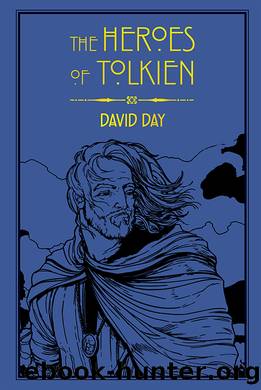The Heroes of Tolkien by David Day;

Author:David Day;
Language: eng
Format: epub
Publisher: Simon & Schuster
Bilbo Baggins
Bag End, home of Bilbo Baggins
âThe Shire is based on rural England and not any other country in the world,â Tolkien once wrote. It was also âa parody of rural England, in much the same sense as are its inhabitants: they go together and are meant to. After all the book is English, and by an Englishman.â
BILBO BAGGINS OF BAG END
The first and original Hobbit created by J. R. R. Tolkien was a certain gentlehobbit by the name of Bilbo Baggins. We have examined the word âhobbitâ and observed what that word contributed to the race. Now let us examine the given names of the quintessential Hobbit, Bilbo, and see what they contribute to his individual character.
Let us begin with the surname: Baggins can be related to a Middle English Somerset surname, Bagg, meaning âmoneybagâ or âwealthyâ, while âbagginsâ is a Lancashire dialect word for âafternoon tea or snack between mealsâ. Certainly, Baggins is an appropriate family name for a prosperous and well-fed Hobbit. Superficially and initially, Bilbo Baggins is presented as a mildly comic, home-loving, rustic, middle-class gentlehobbit. He is harmless and obsequious, full of gossip, homely wisdom, wordy euphemisms and elaborate family histories. He is largely concerned with home comforts, village fetes, dinner parties, flower gardens, vegetable plots and grain harvests.
Bilbo Baggins is a comic anti-hero who goes off on a journey into a heroic world. It is a world where the commonplace knocks up against the heroic. Values are different in these worlds. In Bilbo Baggins we have a character with modern everyday sensibilities whom the reader may identify with but who has an adventure in an ancient heroic world.
Another aspect of Bilbo Bagginsâs character is revealed by an analysis of his first name. The word âbilboâ entered the English language in the fifteenth century and probably derives from the Basque city of Bilbao, once renowned for the making of delicate swords of flexible, but almost unbreakable, steel. In Shakespearean times, a bilbo was a short but deadly piercing sword â a small thrusting rapier.
This is an excellent description of Bilboâs sword, the charmed Elf knife called Sting. Found in a Troll hoard, Bilboâs bilbo is an Elven blade that can pierce through armour or animal hide that would break any other sword. In The Hobbit, however, it is our heroâs sharp wit rather than his sharp sword that gives Bilbo the edge. Whether heâs escaping from Orcs, Elves, Gollum or the Dragon, Bilboâs sharp wit allows him to solve riddles and trick villains.
When we put the two names together as Bilbo Baggins, we have two aspects of our heroâs character, and to some degree the character of Hobbits in general. On the face of it, the name Baggins suggests a harmless, well-to-do, contented character, while the name Bilbo suggests an individual who is sharp, intelligent and even a little dangerous.
Download
This site does not store any files on its server. We only index and link to content provided by other sites. Please contact the content providers to delete copyright contents if any and email us, we'll remove relevant links or contents immediately.
We Ride Upon Sticks by Quan Barry(34046)
The Secret History by Donna Tartt(18269)
Norse Mythology by Gaiman Neil(12880)
Crooked Kingdom: Book 2 (Six of Crows) by Bardugo Leigh(11994)
The Betrayed by Igor Ljubuncic(11638)
The Betrayed by Matthew Dickerson(11444)
Caraval Series, Book 1 by Stephanie Garber(9944)
Year One by Nora Roberts(9342)
Oathbringer by Brandon Sanderson(9223)
Twilight Siege: A Dark Fantasy Novel (The Fae Games Book 2) by Jill Ramsower(9078)
The Priory of the Orange Tree by Samantha Shannon(8656)
The City of Brass by S. A. Chakraborty(8543)
Red Rising by Pierce Brown(8304)
Confessions of an Ugly Stepsister by Gregory Maguire(7682)
Little Fires Everywhere by Celeste Ng(6894)
Shalador's Lady by Anne Bishop(6670)
Storm and Silence by Robert Thier(6512)
This Is How You Lose Her by Junot Diaz(6476)
Shadows Of The Apt [01] - Empire in Black and Gold by Adrian Tchaikovsky(6431)
